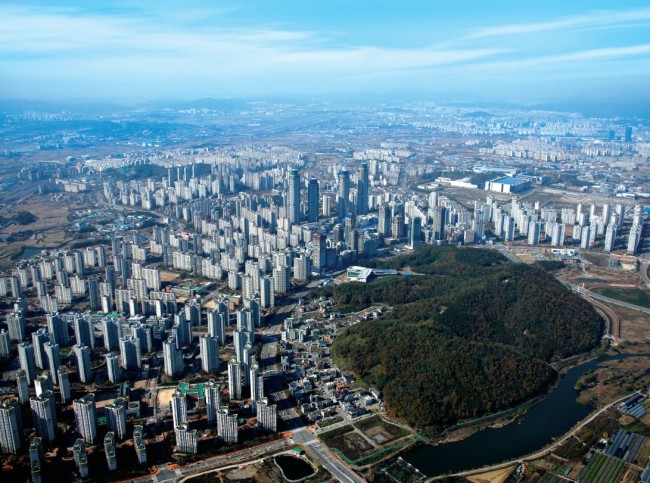Among all commodities needed in human life, a residence is the most fundamental factor and should be supplied on a stable basis to everybody, according to the Korea Land & Housing Corporation.
“As a state-run housing coordinator, we have worked over the past few decades to expand the range of supply, especially for the socially disadvantaged,” said an official.
LH was established in 2009 as a comprehensive land and housing management organization, as a result of the merger of the former Korea National Housing Corporation and the Korea Land Corporation.
The state-owned company first kicked off its housing welfare project in 1989, shortly after the 1988 Seoul Olympic Games when the city’s rent costs skyrocketed.
To respond to the market needs, the government came up with the plan to build 250,000 units of permanent rental houses, which were to be offered to low-income bracket households at a relatively cheap price.
The project was temporarily halted in 1993, due to local society’s negative perspective of rented houses, but was revived in 2009 upon the surge of in-city housing demands.
As of the end of last year, LH owned 550,000 units of such rental houses and apartments, their respective rental period varying from five years to almost permanent, according to officials.
“Since 2004, our prime focus has been on the so-called urban poor groups, who are forced to live in the city for their living but cannot afford regular housing rental costs,” the official explained.
“As a state-run housing coordinator, we have worked over the past few decades to expand the range of supply, especially for the socially disadvantaged,” said an official.
LH was established in 2009 as a comprehensive land and housing management organization, as a result of the merger of the former Korea National Housing Corporation and the Korea Land Corporation.
The state-owned company first kicked off its housing welfare project in 1989, shortly after the 1988 Seoul Olympic Games when the city’s rent costs skyrocketed.
To respond to the market needs, the government came up with the plan to build 250,000 units of permanent rental houses, which were to be offered to low-income bracket households at a relatively cheap price.
The project was temporarily halted in 1993, due to local society’s negative perspective of rented houses, but was revived in 2009 upon the surge of in-city housing demands.
As of the end of last year, LH owned 550,000 units of such rental houses and apartments, their respective rental period varying from five years to almost permanent, according to officials.
“Since 2004, our prime focus has been on the so-called urban poor groups, who are forced to live in the city for their living but cannot afford regular housing rental costs,” the official explained.

Priority is given to the beneficiaries of national basic livelihood funds and one-parent families, and then to low-income families earning less than 2.1 million won ($1,890) per month and physically handicapped citizens.
The corresponding project is currently being implemented in the metropolitan area, including Seoul, Incheon and Gyeonggi Province.
“The total cost per unit, which is the security deposit and the monthly rent combined, is about 30 percent of the average market price,” the official said.
The standard rental period is two years and the tenants may extend their contract up to four times, within the 10-year maximum, he added.
“There were, however, limits to the number and location of these rental houses as they had to be newly built or purchased by LH,” the official said.
This is why the corporation also started in 2005 a special lease system, in which the tenant applicant could choose a house and LH would provide a rent subsidy and take charge of the contract procedure.
It is differentiated from the mortgage loans offered by financial organizations as LH is to be the direct contracting party.
“This is significant as it may most suitably fit the special needs of the socially weak, especially the physically disadvantaged,” the official said.
The system is active in Seoul, other major metropolitan cities and all administrative units with a population of 200,000 or more. Parentless households, however, are subject to the given benefits, regardless of the location.
University students, too, are classified as a special group since their living hardships have been a major social issue in recent years, the official said.
“Students from low-income families are often caught up in the vicious economic spiral, pressed by the high tuition fees and living costs,” he said.
“Preoccupied with multiple part-time jobs, they find it difficult to focus on their studies and may eventually suffer disadvantages when finding a permanent job.”
The beneficiaries are to pay a 1-million-won security deposit and around 100,000 won monthly rent, which is visibly lower than the market price. The required cost is to be even lower for those who opt to share a room.
“Last year, we saw some initial hurdles as landlords and real estate agents were not well acquainted with the new system,” the official explained.
“In an aim to realize residential welfare, however, the entire organization worked to promote the students’ rental house system, and such efforts turned out to be productive.”
As of the end of last year, a total of 10,349 units were provided to low-income university students, according to LH.
Those who wish to apply for an LH rental house may call 1577-3399 or refer to LH’s rental information website (jeonse.lh.or.kr).
By Bae Hyun-jung (tellme@heraldcorp.com)
-
Articles by Korea Herald








![[Graphic News] More Koreans say they plan long-distance trips this year](http://res.heraldm.com/phpwas/restmb_idxmake.php?idx=644&simg=/content/image/2024/04/17/20240417050828_0.gif&u=)
![[KH Explains] Hyundai's full hybrid edge to pay off amid slow transition to pure EVs](http://res.heraldm.com/phpwas/restmb_idxmake.php?idx=644&simg=/content/image/2024/04/18/20240418050645_0.jpg&u=20240419100350)






![[From the Scene] Monks, Buddhists hail return of remains of Buddhas](http://res.heraldm.com/phpwas/restmb_idxmake.php?idx=652&simg=/content/image/2024/04/19/20240419050617_0.jpg&u=20240419175937)

![[KH Explains] Hyundai's full hybrid edge to pay off amid slow transition to pure EVs](http://res.heraldm.com/phpwas/restmb_idxmake.php?idx=652&simg=/content/image/2024/04/18/20240418050645_0.jpg&u=20240419100350)

![[Today’s K-pop] Illit drops debut single remix](http://res.heraldm.com/phpwas/restmb_idxmake.php?idx=642&simg=/content/image/2024/04/19/20240419050612_0.jpg&u=)